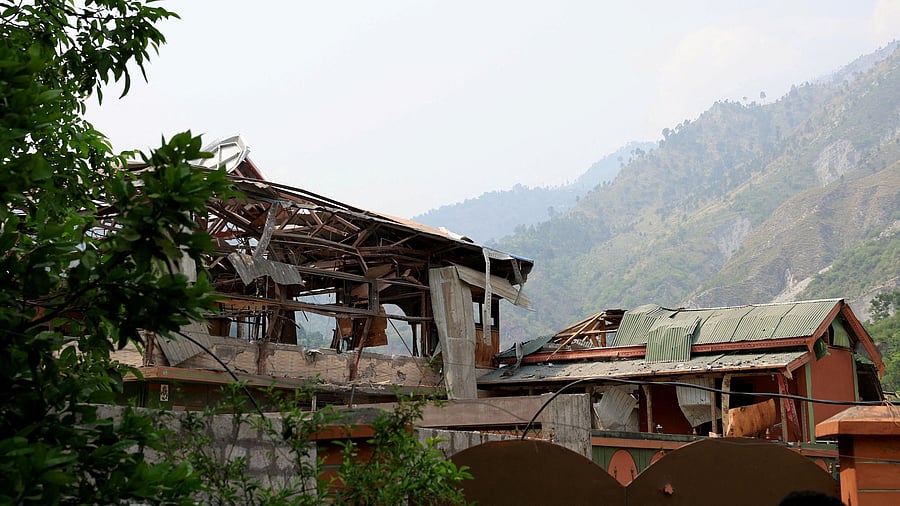
A damaged portion of Bilal Mosque is seen after it was hit by an Indian strike in Muzaffarabad, the capital of Pakistan-administered Kashmir, May 7, 2025. Representative image.
Credit: Reuters Photo
Over the past few days, television channels have repeatedly shown a house destroyed in Muzaffarabad. I called my elder brother and asked, “Hope that was not our house.” He replied, “No, ours was burnt way back in October 1947.”
I come from what is now called Pakistan Occupied Kashmir (POK). My father’s family was from Muzaffarabad, the present capital of POK, and my mother’s family from a village called Gari Habibullah Dupatta Hatian, about 14 miles away.
Partition divided India in 1947, but the Kashmir issue was not a direct result of Partition. It arose from the indecision of the Maharaja of Jammu and Kashmir in signing the Instrument of Accession with India. Theories abound. Many believe that, encouraged by foreign powers, the Maharaja was trying to remain independent. After India’s independence, Kashmir acquired immense strategic significance in the emerging post-war Great Game which was unfolding, with its borders touching Communist China, Afghanistan, and close to Tajikistan, then part of the Soviet Union.
While Maharaja Hari Singh hesitated, brutal Pashtoon tribesmen--called Kubailis--were mobilised by Pakistan. On October 21, 1947, my mother’s village was attacked. The Maharaja’s police and army vanished or were eliminated. Killing, looting, and plundering followed. Women and children, including my maternal aunts and their young children, drowned themselves in the Kishen Ganga (now called Neelam). My younger maternal uncle was struck in the neck with a sword as he fled into the forest -- a scar he bore all his life. He carried a bag of gold guineas, which he flung into the woods; while the Kubailis rushed to hunt for them, he managed to escape into the river. But there were also stories of goodwill and friendship. Several relatives--including my elder maternal uncle and aunt-- sheltered by their former employees and friends, regardless of religion. They were eventually brought to refugee camps in India by the Red Cross .
My paternal grandfather, an Arya Samaji, disciple of Swami Dayanand Saraswati, journalist and educationist, freedom fighter, and associate of Lala Lajpat Rai, was a marked man. He was shot while crossing the Muzaffarabad bridge. My grandmother and the rest of the family were saved by local residents and later rescued by the Red Cross, which transported them --along with whatever few belongings they could carry --to refugee camps in India.
After looting Muzaffarabad for three days, the raiders advanced towards Srinagar. As they reached Baramulla, just 50 km from Srinagar, the dithering Maharaja finally woke up to reality. He acceded to India on October 26, 1947, and fled Srinagar. The next day, Indian air and ground forces landed in Srinagar. They advanced as far as Poonch and Kargil but were ordered to stop before they could reach Muzaffarabad. On January 1, 1949, a United Nations-mediated ceasefire came into effect. That dividing line remains the Line of Control to this day.
My father, an army officer who had fought in the Burma Campaign during World War II, was posted to Ramgarh near Ranchi, after the war ended. My mother and siblings arrived there from Muzaffarabad in July 1947-- just three months before the Kubaili attack. I can only imagine the trauma, sorrow, loss of life, homelessness, and penury they endured, starting life again from scratch in alien refugee camps across the country.
My father went on to serve in the Kashmir front again in 1948 under the command of General K S Thimmaya. I was born in a safe military hospital in Dalhousie. In those days, forward areas had no family stations. Most ‘separated families’ lived in hill stations, which were considered safe and had good schools. My childhood was spent in either hill stations or colonial army cantonments, isolated from the city and civilian life--surrounded by gardens, parks and regimental routines.
We lived in this charmed world -- with no State or village -- but with a deep sense of belonging to India, while hearing traumatic stories of what had happened to our homes and relatives in Muzaffarabad and Village Hatian. A memory from perhaps 1954 or 1955 is deeply etched in my mind. My father was posted in Jabalpur and there were terrible communal riots in “the city”. I remember standing in the porch with him, when the tailors who attended to our requirements, all Muslim, asked for permission to come inside the bungalow. They came in with a rickshaw carrying two sewing machines and told my father, “Sahib, there are riots in the city. These machines are our dana pani (food and water). Please allow us to keep them here until the riots are over. Or else we’ll be ruined.” I remember my father quietly replying, “Keep them here.” We were delighted, because these were foot pedal machines, not the hand machine, like my mother had, and we played with them endlessly, and were indeed sorry to see them go. But I realised the ethical significance of my father’s action only much later.
My elder brother joined the army, and had several postings on the Kashmir, Punjab border. He had vivid memories of our maternal home and kept track of it through local sources. During the 1960s our home was the Deputy Commissioner’s Office, during the 1970s and 1980s it became Brigade Headquarters, and then during the 1990s it had turned into a terrorist training camp.
I am proud to be perhaps the only Muzaffarabad person who served in the IAS, and feel extremely privileged to belong to Karnataka, my Karmabhumi, the most enlightened and progressive state.
Life has done full circle. The attacks on Muzaffarabad and Gari Hatian, which I heard as a child, I hear again in my evening years.
(The writer is a retired secretary to Government of India - Development of the North Eastern Region)